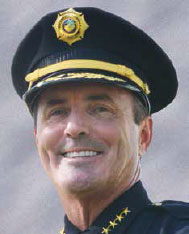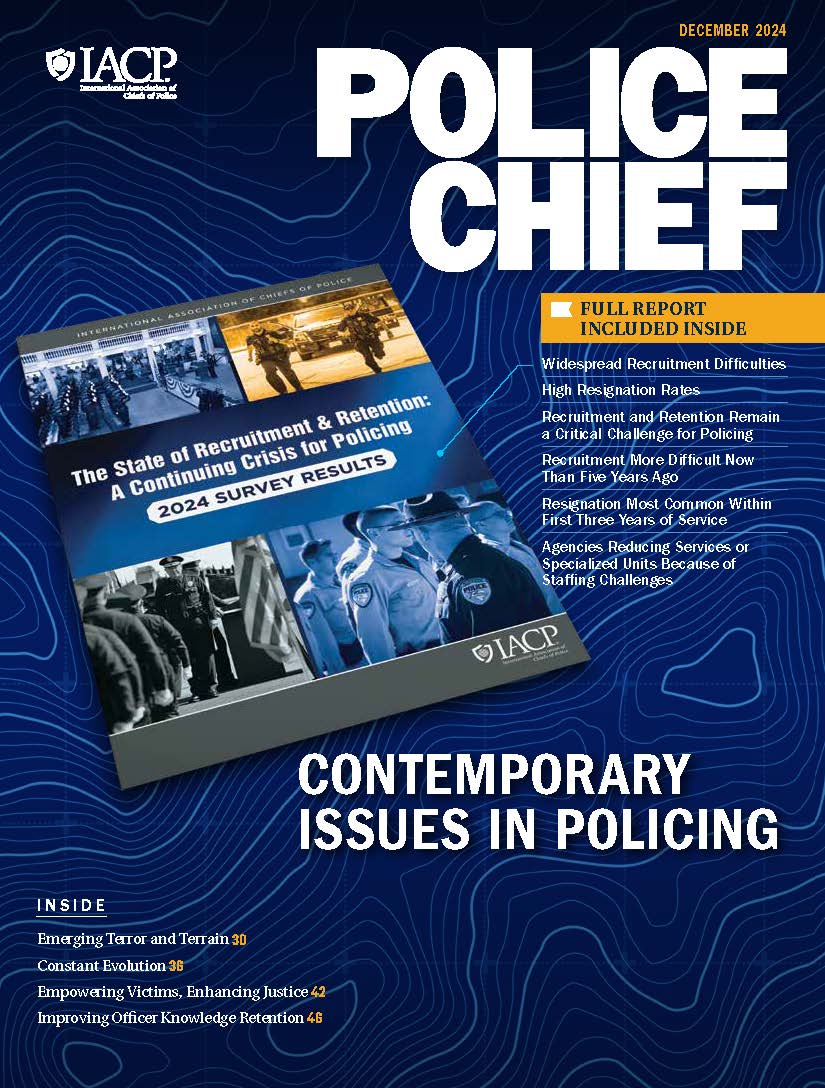 It’s hard to believe that almost a year ago I was being sworn in as the president of the International Association of Chiefs of Police. As I take a moment to reflect back on the past year, I can’t help but feel humbled and appreciative of the opportunity I was given. I had the chance to meet and talk with many global policing professionals who embody what it means to be a law enforcement officer—putting the safety of our communities and those we serve above all else. The dedication, devotion, and collective wisdom of the leaders that I crossed paths with throughout the year are unwavering and truly remarkable. I would like to thank all of you for your service as law enforcement professionals and for your work and leadership on behalf of the association and the profession.
It’s hard to believe that almost a year ago I was being sworn in as the president of the International Association of Chiefs of Police. As I take a moment to reflect back on the past year, I can’t help but feel humbled and appreciative of the opportunity I was given. I had the chance to meet and talk with many global policing professionals who embody what it means to be a law enforcement officer—putting the safety of our communities and those we serve above all else. The dedication, devotion, and collective wisdom of the leaders that I crossed paths with throughout the year are unwavering and truly remarkable. I would like to thank all of you for your service as law enforcement professionals and for your work and leadership on behalf of the association and the profession.
As a chief, my top priority is my officers. I spend a large part of my day listening to their concerns, worries, and suggestions and doing my best to keep them safe, happy, and functioning efficiently and effectively in their jobs and in their lives at home. In assuming the role of president of the IACP, I knew I wouldn’t just be answering to the 131 officers of the Doral, Florida, Police Department, but the entire membership of the IACP and the profession more broadly. I wanted to make it a point to hear from law enforcement professionals all over the world. I knew that listening to these diverse perspectives would allow the association to serve the field even more effectively. In addition, these perspectives would help guide the way in strengthening the policing profession.
It was less than a month into my term as president when the law enforcement community was shaken by a series of unprovoked, violent attacks against police officers in the United States. In November 2016, four U.S. officers in three states were victims of ambushstyle attacks, all within a 24-hour period. I spoke to chiefs who were telling their officers to avoid eating in public facilities while in uniform or to always have at least two officers in a patrol car. I was also hearing from those officers who were out patrolling the streets every day that they felt like they were being targeted.
I knew something had to be done. The level of violence facing our officers is of great concern and that is why I stood up a task force to address global violence against law enforcement. This task force met and also hosted a series of focus groups with line officers, mid-rank officers, and community members. These meetings helped us to gather input and guidance on the issue of violence against the police and to develop concrete recommendations to help prevent further tragedies. The information we heard in these focus groups was both interesting and sobering. In response to the messages we heard, IACP developed a series of new and updated resources addressing the topic of violence against the police. It is my hope that these resources will help law enforcement leaders as they work to understand officer fears and concerns relative to safety and preparedness and to implement new initiatives and programs to keep their officers safe.
In an effort to continue to hear directly from you, our members, the IACP continued our Critical Issues Forum tour that began in 2016. We held listening sessions in Arizona, Illinois, Tennessee, New York, California, and Montreal. An additional session will occur this month, in Philadelphia, Pennsylvania, at the IACP Annual Conference and Exposition. The purpose of these Critical Issues Forums is to hear directly from police leaders in the United States and Canada about the challenges confronting their respective agencies and the profession—and how IACP can assist on both fronts. The topics and policy issues emerging from these sessions will define and guide the efforts to be undertaken by IACP over the next several years. Issues like recruitment and retention, police morale, public safety’s role in public health, and community-police relations have been reccurring themes in these sessions.
The topics of de-escalation and use-of-force have also been continual focal points. Whether the pressure is from the media, political figures, community members, or other groups, law enforcement agencies are being asked to examine their current use-of-force tactics and policies. This trend is why, in 2016, the IACP formed a partnership with the Fraternal Order of Police to convene a leadership summit with law enforcement organizations to examine use of force by law enforcement officers, discuss differences surrounding proposals that seek to change useof- force standards, identify areas of consensus, and collectively map out a path forward on use-of-force issues. As a result, the IACP and 10 other law enforcement organizations released a comprehensive, national consensus policy and discussion paper on use of force to aid agencies as they examine and develop their own policies.
Advocating for law enforcement is not just about listening, it is also about action. We make sure that IACP’s advocacy efforts on behalf of the law enforcement profession and police executives are a constant priority. The IACP has worked diligently to establish relationships within the U.S. administration and international counterparts and strives to educate those in newly elected and appointed positions about the association and issues of importance to the law enforcement profession.
The IACP works with the U.S. federal government administration, as well as with members of the U.S. Congress, on a wide range of issues critical to public safety and the law enforcement profession, such as asset forfeiture, information sharing, access to equipment, immigration, criminal justice reform, and the funding of grant programs. We constantly provide feedback on legislation as it is being drafted to ensure it takes law enforcement considerations into account. We testify before the U.S. Congress on topics such as law enforcement’s response and interaction with persons affected by mental illness and the increase in religious hate crimes and law enforcement’s response. We are also preparing to testify on worldwide threats and domestic terrorism in the coming months.
I’ve mentioned the opportunities I had to meet with police leaders around the world in the past year, and that global reach is part of what makes IACP unique. I am proud to say that, this year, IACP reached a record 150 countries, represented by our more than 30,000 members. I’ve traveled the globe to better understand policing needs and promote the value of the IACP in Indonesia, Aruba, Canada, France, Germany, and Taiwan, among other countries. While in Colombia, I met with Police Director General Nieto and Colombian Vice President Oscar Naranjo, and we discussed the role of the police in a post-revolutionary period. In June 2017, we held a Global Policing Forum in Dublin, Ireland, where we partnered with the Garda Síochána of Ireland to discuss policing in the digital age. (Preliminary information will be available at the IACP Annual Conference and Exposition, and a final report will be released in February 2018). Our global impact was also heightened by IACP training in Brazil, Mexico, Nepal, Nigeria, Saudi Arabia, and South Africa.
Clearly, this has been a remarkably busy and productive year for the IACP. I am grateful to you, the IACP members, who gave me this wonderful opportunity. Your dedication and leadership, not just with IACP, but also with this noble profession, has been a true inspiration to me in my career and during my time as president.
I would like to thank the IACP Executive Board and the Board of Directors for the extraordinary leadership they provide to the association. I also want to thank the IACP staff for all the work they do in the field and behind the scenes. I would also like to thank my family, friends, and my colleagues at the Doral, Florida, Police Department for their support over the years. Lastly, I would like to offer IACP First Vice President Louis M. Dekmar my congratulations and complete support as he assumes the IACP presidency. I know he will do a terrific job leading our organization and continuing to advocate on behalf of the profession. I look forward to continuing to be actively involved in the IACP and serving in any way that I can. ♦


